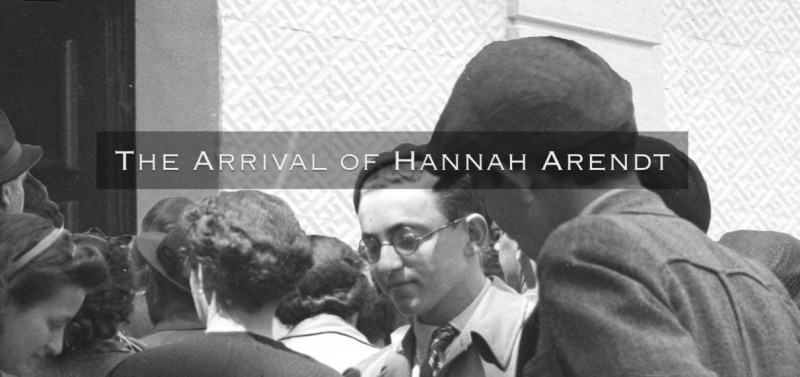
The Arrival of Hannah Arendt
This film describes the arrival of Hannah Arendt - a Jewish, German-American political theorist and publicist - in New York and her reflections on flight and helping people start over.
Immer wieder jetzt die gleiche Frage
„Arisch oder nicht?”
Und wer mich wieder fragt,
dem schlag ich ins Gesicht.
Ich bin ein Mensch wie jeder
Nicht weniger und nicht mehr,
Und ich hab nur ein einzig Leben
Und nur eine einzige Ehr’.
Ich bin ein Mensch gleich allen
Und hab ein Menschengesicht
Doch -„arisch oder nicht-arisch”
Nein, das ertrag ich nicht!
Diese ewige Fragerei macht mich ganz krank. Bin ich denn mehr oder weniger, wenn sie es nun plötzlich wissen? Tue ich nicht immer in gleicher Weise meine Pflicht und mehr als das ? „Frau Doktor, jetzt geht es uns bald gut, wenn die Dreckjuden alle aus Deutschland fort müssen”, sagte mir heute eine Patientin. „So, wen kennen Sie denn, der dann alles gehen muß?”, fragte ich. „Ach, eigentlich niemand.” Doch”, sagte ich nachdrücklich, „Sie kennen jemand, der auch gehen muß, wenn alle müssen-mich! Und da ist es wohl besser, Sie suchen sich jetzt schon eine andere Ärztin”.
[…]
Jede Sprechstunde reißt neue Wunden auf, jeder Weg über die Straße ist eine Gefahr, selbst die Kinder in der Schule werden in der Frühstückspause unter dem Schutz eines Lehrers in ein nahes Laubengrundstück geführt, erzählt mir mein Junge, damit es auf der Straße nicht auffällt. Im Autobus fahren sie jetzt getrennt nach Hause, „damit nicht so viele jüdische Kinder zusammen gesehen werden!“.
Again and again the same question
“Aryan or not?”
And whoever asks me again,
I’ll punch him in the face.
I am a human being like everyone else
No less and no more,
And I have only one life
And only one honor.
I am a human equal to all
And have a human face
But “Aryan or non-Aryan”?
No, I can’t stand that!
This eternal questioning makes me sick. Am I then more or less if they now suddenly know ? Do I not always do my duty in the same way and more than that ? “Doctor, we will soon be fine when the dirty Jews all have to leave Germany,” a patient told me today. “So, who do you know that has to leave then?”, I asked. “Oh, no one, actually.” But,” I said emphatically, “you know someone who also has to go when everyone has to – me! And so it is probably better for you to find another doctor right now.”
[…]
Every consultation tears open new wounds, every walk across the street is a danger, even the children at school are led to a garden under the protection of a teacher during the breakfast break, my boy tells me, so as not to be noticed on the street. In the bus they now go home separately, “so that not so many Jewish children are seen together!”.
Hertha Nathorff, née Einstein (1895-1993) was a German pediatrician, psychotherapist and social worker, she published several works, including a book of poems. She was born in Laupheim (Baden-Württemberg) into a Jewish family. She was related to the physicist Albert Einstein, the musicologist and music critic Alfred Einstein, and the film producer Carl Laemmle. Nathorff attended high school in Ulm and, interrupted by a temporary job as a nurse during World War I, studied medicine in Munich, Heidelberg, Freiburg (Breisgau) and Berlin from 1914. After receiving her doctorate degree in Heidelberg (1920) and years as an assistant in Freiburg, she was a senior physician at the Red Cross Women’s and Children’s Home in Berlin-Lichtenberg from 1923-28, then worked in private practice and simultaneously at the Charlottenburg Hospital as head of the family and marriage counseling center. In the course of National Socialist racial policies, she lost her medical license in the fall of 1938, while her husband, formerly a senior hospital doctor in Berlin-Moabit, was granted a license for exclusively Jewish patients. During this period she worked as his receptionist.
Threatened with death in Nazi Germany, she organized emigration with the help of American relatives from November 1938, sending her 14-year-old son ahead to England on a Kindertransport. In April 1939 the couple managed to leave the country for London, and in early 1940 they continued their journey to New York. In New York she worked as a nurse, maid, bar pianist and kitchen help to support the family. She remained a physician’s assistant in her husband’s practice, which opened in 1942 – she did not have the time to get her degree recognized.
Hertha Nathorff took a very active part in the social life of the German-speaking exile community: she organized courses for emigrants in nursing and infant care and cultural events, was the founder of the Open House for the elderly, chairwoman of the women’s group, and an honorary member of the presidium of the New World Club. In the excerpts from the diary of Hertha Nathorff Berlin-New York Aufzeichnungen 1933 bis 1945, which we show in our archive, the author deals with her initial problems, disappointments and mortifications in the New World. She reports on the everyday life of emigrants, on the struggle for existence, on poverty and mental destruction. Despite her longing for the places of her childhood and youth, she never visited Germany again. She never really settled in America. The homesickness remained constant.
Excerpt from the diary of Hertha Nathorff, edited and introduced by Wolfgang Benz (1987): Das Tagebuch der Hertha Nathorff. Berlin – New York. Aufzeichnungen 1933 bis 1945. Schriftenreihe der Vierteljahrshefte für Zeitgeschichte, Band 54. R. Oldenbourg Verlag München, pp. 43 and 51.
Translation from German to English © Minor Kontor / We Refugees Archive.